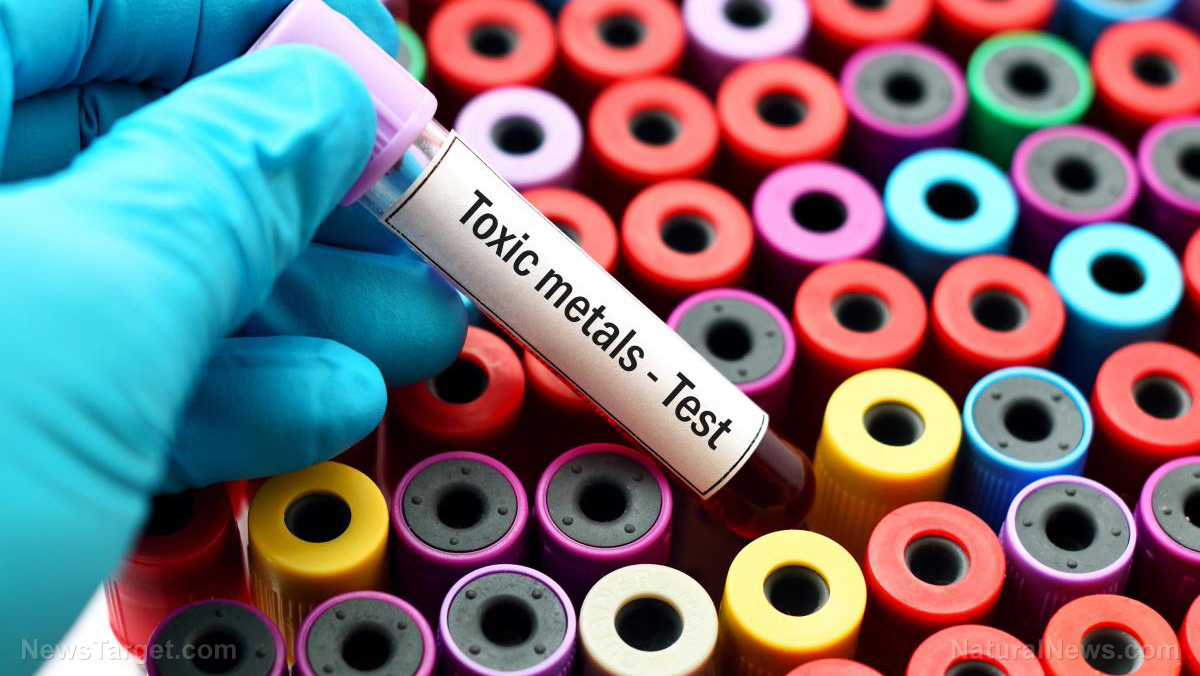Study links 6 contaminant metals in urine to increased heart disease and mortality risk
08/08/2024 / By Olivia Cook

Researchers from Columbia University have found that individuals with high levels of six metals in their urine – cadmium, cobalt, copper, tungsten, uranium and zinc – face a 66 percent higher risk of mortality. In addition, these individuals posted a 29 percent increase of developing cardiovascular disease (CVD).
In their study published in the journal Circulation on August 1, the researchers stated that evidence is increasingly showing that involuntary environmental exposures, including contaminant metals, are significant modifiable risk factors for both clinical and subclinical CVD and all-cause mortality. These findings and insights can guide and help develop the creation of innovative preventive strategies to enhance and improve cardiovascular health.
Heavy metals are elements and compounds that can negatively impact health. While small amounts of many metals are necessary for life, excessive levels can be toxic. Common heavy metals that people are exposed to include aluminum, antimony, arsenic, barium, beryllium, cadmium, cesium, copper, lead, mercury, nickel, thallium, tungsten and uranium. (Related: Heavy metal toxicity symptoms explained: Are you poisoned?)
Increasing levels of pollution and the use of industrial chemicals have led to increased exposure and raised the dangers and threat of heavy metal toxicity – greatly endangering child development and overall health and well-being. High levels of these toxic metals in body tissues and the brain can lead to significant development and neurological issues.
Research has shown that exposure to certain metals can be linked to CVD and increased risk of death. However, previous studies focused mainly on arsenic, cadmium and lead. (Related: Heavy metal toxicity is a hidden epidemic.)
Cadmium, cobalt, copper, tungsten, uranium and zinc linked to coronary artery calcification
This study aimed to explore how urinary levels of various metals relate to CVD and overall mortality among a diverse group of U.S. adults as part of the government-sponsored Multi-Ethnic Study of Atherosclerosis.
The researchers expanded their focus beyond arsenic, cadmium and lead to include metals like tungsten and uranium, which aren’t essential for the body but may be harmful. They also looked at cobalt, copper and zinc, which are essential in small amounts but can be toxic in excess.
Cadmium, cobalt, copper, tungsten, uranium and zinc were chosen because they are linked to coronary artery calcification, a sign of artery damage from fatty deposits.
The study involved nearly 6,600 participants from cities such as Baltimore, Chicago, Los Angeles, New York, St. Paul and the Winston-Salem area of North Carolina, with an average age of 62 years. About 53 percent of the participants were female. Their urine metal levels were measured between 2000 and 2001 and tracked until December 2019.
Researchers used statistical models to analyze the relationship between urinary levels of cadmium, tungsten, uranium (non-essential metals) and cobalt, copper and zinc (essential metals) with CVD and mortality rates. They also examined how combinations of these metals affected survival over 10 years.
Over the study period, 1,162 participants developed CVD and 1,844 died. When comparing the highest to the lowest levels of these metals, the risk ratios for developing cardiovascular disease and dying from any case were as follows:
- Cadmium: 1.25 for CVD, 1.68 for mortality
- Cobalt: 1.24 for CVD, 1.37 for mortality
- Copper: 1.42 for CVD, 1.50 for mortality
- Tungsten: 1.20 for CVD, 1.16 for mortality
- Uranium: 1.32 for CVD, 1.32 for mortality
- Zinc: 1.21 for CVD, 1.38 for mortality
The study found a clear link between higher levels of cadmium and copper and increased risks for both endpoints. The overall survival probability decreased with higher baseline urinary levels of cadmium, cobalt, copper and zinc.
The research suggests that higher levels of these metals in urine are associated with an increased risk of CVD and higher mortality rates. These insights could help in developing new strategies to improve heart health and prevent cardiovascular issues.
Watch this video discussing heavy metal toxicity.
This video is from the Daily Videos channel on Brighteon.com.
More related stories:
Cadmium poisoning signs and symptoms: Are you being poisoned by this heavy metal?
Detox heavy metals from your body with these 10 foods.
Stolen cobalt-60 proves how easily dirty bomb materials can be acquired and deployed.
Copper toxicity associated with depression, schizophrenia and other disorders.
Heavy metal tungsten linked to leukemia clusters in children.
Sources include:
Submit a correction >>
Tagged Under:
cadmium, cobalt, copper, discoveries, ecology, environment, health science, heart disease, heart health, longevity, men's health, metals, poison, real investigations, research, toxins, tungsten, uranium, women's health, zinc
This article may contain statements that reflect the opinion of the author
RECENT NEWS & ARTICLES
COPYRIGHT © 2019 Dangerous.News
All content posted on this site is protected under Free Speech. Dangerous.News is not responsible for content written by contributing authors. The information on this site is provided for educational and entertainment purposes only. It is not intended as a substitute for professional advice of any kind. Dangerous.News assumes no responsibility for the use or misuse of this material. All trademarks, registered trademarks and service marks mentioned on this site are the property of their respective owners.




















